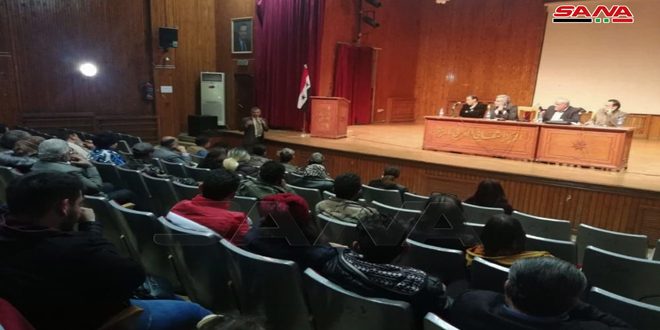Neo liberal attempts to control Arab art and culture and abolish the culture of resistance and confront Zionism in the region were the axes of the symposium held by the Arab Cultural Center in Mezza on Wednesday 3rd of March.
During his participation in the symposium, researcher Fadil Abdullah highlighted the importance of resistance writers and their impact on Arab culture, especially those who were assassinated by Zionism such as Kamal Khair Bek, Ghassan Kanafani, Majid Abu Sharar and Kamal Nasser after they posed a danger in educating the Arab generation and promoting militant ideology in them.
Abdullah pointed to the great attempts of neoliberalism in trying to erase the memory of the present generation and direct them to ways that fit the agenda of the occupation. .
Artist Suleiman Kattan pointed out the seriousness of the behavior of the artists and actors who were affected by what the West and Zionism convinced them, so they left their homeland only to face disappointment. He also shed light on the meanings embodied by the artists who preserved their principles and kept defending their homeland unconcerned with the difficulties they faced and the dangers that beset them.
Researcher Bakour Al-Aroub spoke about the dangers of the weakness and diffusion of the Arabic language, the domination of dialects over the culture, the spread of so-called “spoken poetry”, and its attempt to control culture. He underlined the importance of attaching importance to classical Arabic, especially in embodying civilization and culture in order to accurately reach the future.
Al-Aroub believed that interest in culture, originality and Arabism is one of the foundations that strengthen belonging to the homeland, due to the fact that it is one of the most important phenomena that motivates a person to defend his land and dignity.
Director Muhammad Nasrallah and poets Ahmed Dhamam, Thaer Mahfoud and Mahmoud Najjar presented interventions that added to the symposium ideas about fighting modern liberalism and fighting cultural conquest.
Inas Abdulkareem

